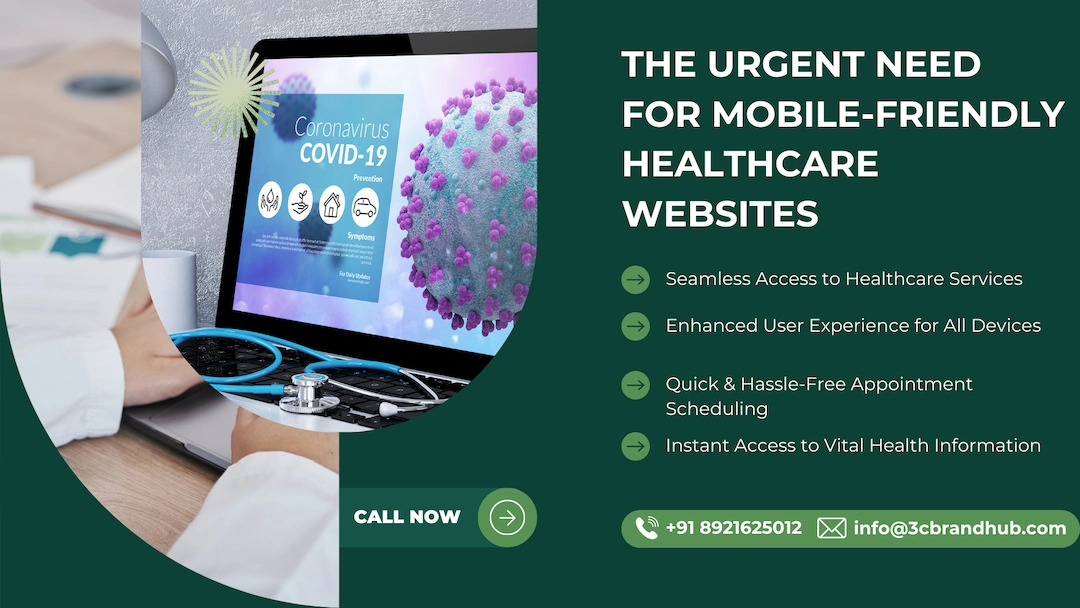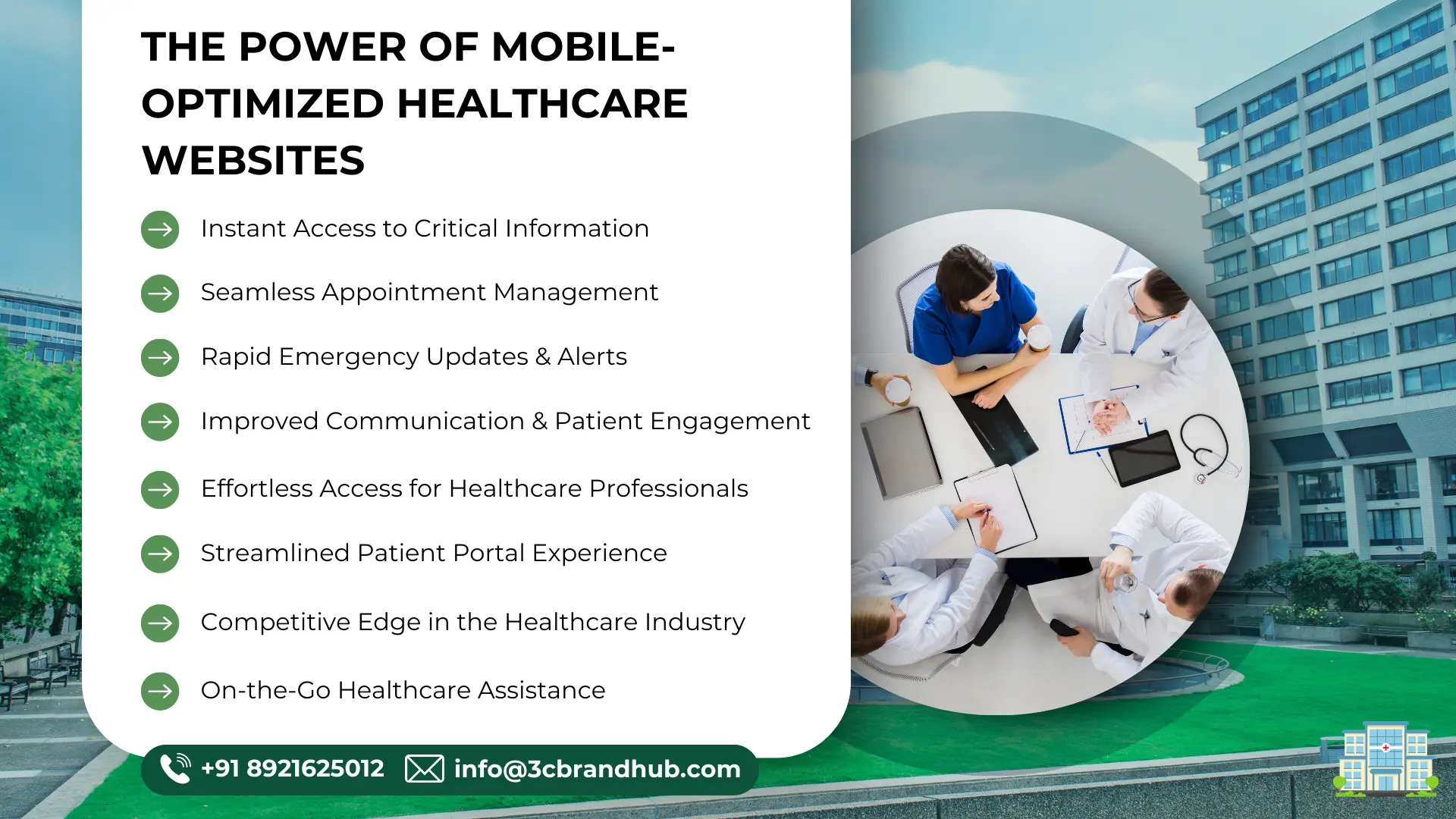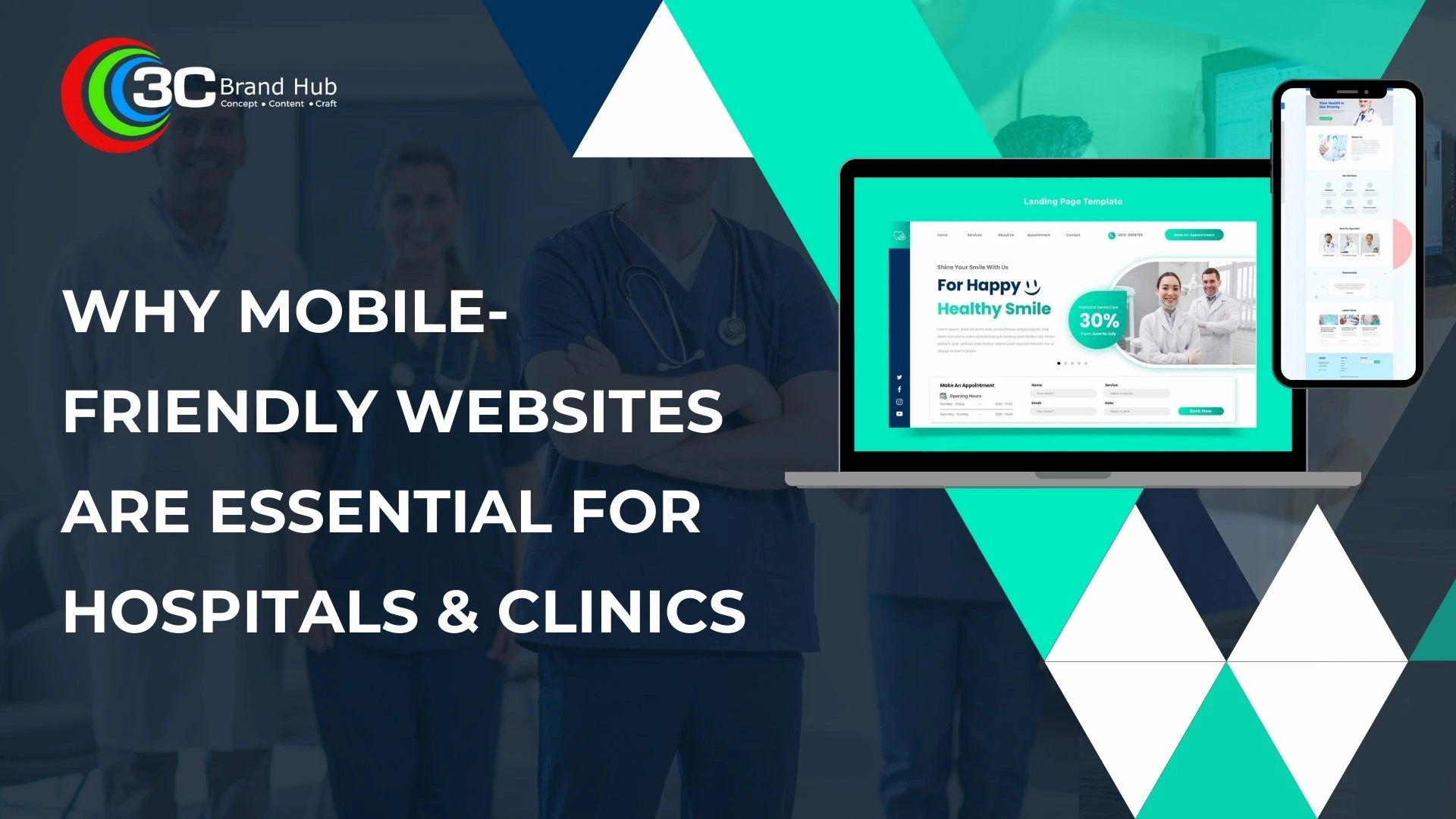Have you ever thought about how important it is for hospitals and clinics to have websites that focus on patient’s needs rather than the marketing intentions of hospital owners? When talking about patient-focused website for hospitals, mobile-friendliness is a crucial area to consider. In this blog, we will help you explore the sheer need for designing healthcare websites for patients, with exactly them in mind, emphasizing mobile accessibility.
Why Do Healthcare Websites for Patients Need to Be Mobile-Friendly?
Today more two two-thirds of the population in the majority of the countries globally use smartphones for their day-to-day needs. Given that using healthcare facilities is one of their basic needs, healthcare providers shouldn’t ignore the need for mobile-friendly website for hospitals for the following reasons:

Better Accessibility for Patients:
Healthcare facilities that use mobile friendly websites are two times more likely to allow their patients to access their healthcare services than their counterparts who don’t. It essentially translates into more trust and loyalty from patients.
Improved User Experience:
Mobile-friendly healthcare website templates are highly responsive. They can easily adjust to different screen sizes and types. Users can experience easy navigation, faster loading and thus more engagement with healthcare providers.
Faster Appointment Bookings:
A mobile-optimized website for healthcare companies simplifies the process of scheduling appointments. Patients do not experience any barrier between them and the healthcare provider which ultimately increases their satisfaction.
Easy Access to Health Information:
In a mobile-friendly website for healthcare, patients can easily locate medical advice, symptom checkers, and telehealth options. This is something that benefits both the patients and the healthcare provider.
Benefits of Having the Best Healthcare Websites Design Compatible with Mobile Devices
Website for hospitals that have been optimized to be compatible with mobile devices serves as an instant source of information to people, particularly the patients. Here are the key advantages of such a website.

Patients have instant access to information:
Mobile-compatible healthcare websites allow patients to easily access important information such as medical records, test results etc., at their convenience.
Patients have control over their appointments:
Patients mostly use hospital website for healthcare appointments. If the website can be assessed on their smartphones, they can have even more convenience in scheduling, rescheduling or cancelling appointments.
Emergency updates are quickly passed:
During medical emergencies, mobile-optimized website for clinics and hospitals enable their visitors to access important information like ER wait times, hospital directions, and emergency contact numbers easily.
Better Communication channels with patients:
Today several hospital authorities hire expert designers to make website designs that integrate secure and interactive messaging systems by which patients can make prescription refill requests or receive appointment reminders.
Access to patient information by healthcare professionals:
Just like the patients, healthcare professionals too benefit from a mobile-optimized website design. For instance, they can easily access patient information or medical on their mobile devices and make fast decisions.
Patients Enjoy a Smooth Portal Experience:
Competitive Advantage for Healthcare Organizations:
Healthcare is a highly competitive field. With every entity trying to push itself as superior to others, its digital presence, particularly website for hospitals, is a crucial factor influencing the audience.
Fulfils Patients’ Needs on the Go:
Super-speciality healthcare facilities are far away for many patients. A mobile-optimized website for hospitals could act as an on-the-go map. Such a facility can help patients get directions, book emergency services, or schedule appointments on the go.
What Distinguishes Mobile-Optimized Healthcare Websites for Patients?
Unlike an ordinary website for hospitals, one that is compatible with mobile devices will have the following distinguishing features:
Quickly loading website pages:
No one wants to wait for minutes to load a page. Whether on the website or on the mobile, the pages should load fast without causing the patients or the visitors to skip them and look for alternatives.
A highly responsive design:
A key area that the best website builder for medical practice focuses on is responsive design. When the website has to work on mobile devices as well, it should have buttons and navigation elements, properly sized for fingertip interaction.
Simplified patient portal login:
Visitors to a website for hospitals are mostly non-tech-savvy patients. They should be treated with simplified patient portal login with remembered credentials for faster access along with instant access to hospitals/clinic resources.
How To Make Your Website for Hospitals Mobile-Friendly?
To design healthcare websites for patients which are spot on in terms of mobile compatibility and patient engagement, the first step is to collaborate with professional and specialized website design services for healthcare. With their strong domain experience - interacting with both patients and healthcare facilities - they know what critical areas like appointment booking, page loading time or conversion rate in the context of healthcare services mean. Additionally, make use of compatibility testing services, for instance, Google’s Mobile-Friendly Test, to verify if your website is indeed doing good. Don’t hesitate to update and optimize your website if is lacking behind latest updates that could smoothen the mobile experience.
Conclusion
As long as you are a healthcare provider who wants patients to have a smooth association with your entity, a mobile-friendly website for hospitals is inevitable.
We hope this blog helped you understand the importance of investing in such a website or web design services that help to achieve that.
Do you have any other questions regarding the topics covered here or have suggestions for this blog?
Feel free to write them in the comments section you have below.
Do you think your healthcare websites for patients need a mobile-friendly upgrade? 3C Brand Hub can help you. We are a leading web design and web development services provider specializing in the healthcare industry, serving clients all over India and abroad. In Kerala, we serve clients in all 14 districts including Trivandrum, Ernakulam (Kochi), Thrissur, Pathanamthitta, Kannur, Alappuzha, Kottayam, Calicut and more.
FAQ
What should a hospital website contain ?
A hospital website should essentially have a few basic features such as appointment booking, doctor profiles, type of services offered, contact details and directions, emergency info, patient portals and testimonials. To make all these features easily accessible, the website should most importantly have a mobile-friendly design.
What do you mean by a mobile-friendly website for hospitals?
A mobile-friendly hospital website means that it is easy for patient navigation, is fast loading, facilitates easy appointment booking and has a highly responsive and adjustable design for all screen sizes.
How can we know if our healthcare websites for patients are mobile-optimized?
It is straightforward. Try loading the website on multiple mobile devices with different screen sizes and operating systems (Android and iOS) and see how it performs across them. If you notice a consistently smooth experience across all, you can conclude that it is mobile-optimized.
How can you increase the speed of a site on mobile devices?
If your website doesn’t load fast on mobile devices, it means it isn’t mobile-optimized. You need to get it mobile-optimized first to increase the page loading speed on mobile devices.






